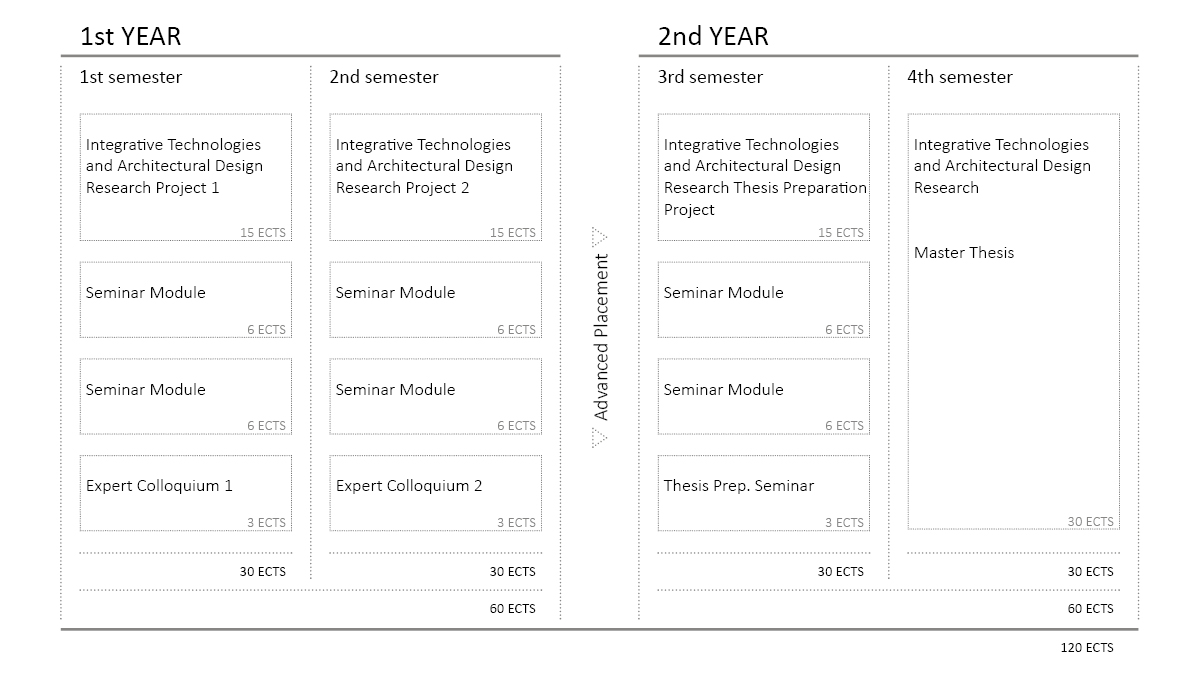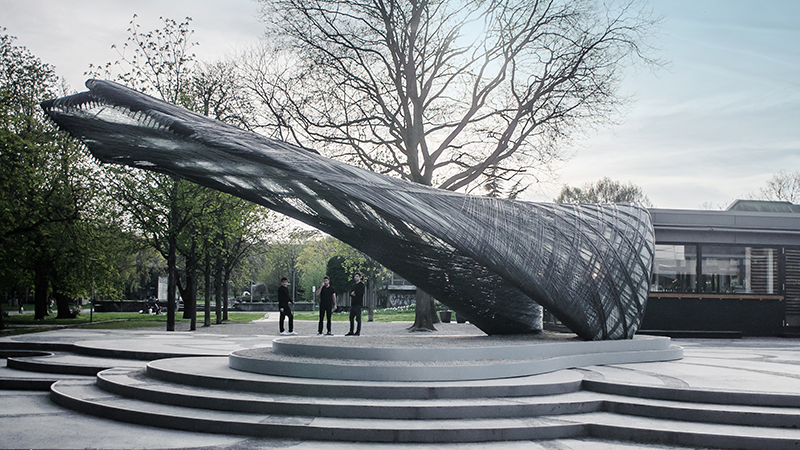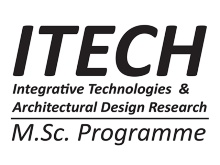INTEGRATIVE TECHNOLOGIES AND ARCHITECTURAL DESIGN RESEARCH (ITECH)
M.Sc. Programme, Faculty of Architecture and Urban Planning
COORDINATING INSTITUTES
The M.Sc. Programme Integrative Technologies and Architectural Design Research is an interdisciplinary, research-oriented, experiment-based programme shaped around contemporary aspects of the built environment and practice.
The goal of the ITECH programme is to prepare a new generation of students from different disciplines for the continuing advancement of technological and computational processes in development of the built environment through merging the fields of design, engineering, construction and natural sciences. Combining an intensive, critical and analytical approach to computational design, simulation and fabrication processes, the ITECH programme is focusing on challenging the design space boundaries of current contemporary architectural and engineering practice. It seeks to provoke a re-examination of techniques, methods and theories of design in relation to the fields of engineering, robotics, digital manufacturing, material science and biology.
ITECH STUDENT PROJECTS
ITECH Student Projects
CURRICULUM
The programme is open to students with a recognized bachelor’s degree in architecture (or architectural science), civil / structural engineering, urban planning, biology or biomimetics, environmental engineering or similar engineering or natural science degrees. All programme courses are instructed in English. The modules of the core ITECH programme are taught by researchers at ICD and ITKE with oversight of Professor Menges and Professor Knippers and input from visiting researchers and scientists. The programme is structured as a 2 year professional master’s degree for students with a 3 year bachelor’s degree. However, students with a suitable 4 years bachelor’s degree or students who already hold a master’s degree may apply for advanced standing after enrolment– subject to the review by the university. Such applicants will be considered for placement in the third semester of the programme.
The programme is structured in two parts: the group Design Research Project in the first year and an individual Master Thesis in the second year. Both projects take advantage of the extensive collaboration among the partner institutes and are supported by a diverse range of seminar modules and expert colloquia, offered by the three institutes. The seminar modules provide the technical and conceptual foundation necessary for the successful development of research projects while allowing students to explore individual areas of interest.

ITECH Curriculum - Overview
WHY ITECH?
Technological progress has always been a catalyst for design innovation in architecture and construction. Today, technological advancements across multiple disciplines suggest a profound transformation of the way the future built environment is conceived, designed and materialized. New alliances are being forged between the fields of design, engineering and natural sciences, leading to novel interdisciplinary and multifaceted design cultures. Design plays a critical role in this transformation: Here, the notion of design is extended beyond the design of space, surface and structure to the design of processes, systems and reciprocities.
The ITECH programme investigates the realm of integrative technological advancements as novel potentials in architecture and construction. It seeks to prepare students for the complex contemporary conditions found in the building industry, which is facing stringent environmental and economic challenges while experiencing the emergence of new technical opportunities at an unprecedented speed. Thus, the master’s programme is inquiry-oriented, experiment-based and shaped around contemporary aspects of design research. Students will engage in cutting-edge computational architectural design techniques, structural and climate engineering and advanced fabrication and construction technologies. The interrelation of such topics will be exposed both as a technical and an intellectual venture. The programme offers the opportunity to study with one of the leading teams for technological and computational design research. As a team, the partner institutes strive to present students with a cutting-edge educational experience that fosters the development of one’s individual interests in architectural design, structures, technology and computation.
If you are an architect, engineer, materials scientist, biologist, or other with a deep interest in how the design and fabrication of our built environment will develop alongside increasingly powerful computation and fabrication technology, the ITECH M.Sc. Programme is for you. The course considers how known and experimental computational systems, materials and fabrication techniques might be applied within the context of architecture and the wider AEC (architecture, engineering, construction) industry. The programme seeks to foster collaboration between students, researchers and industry professionals from multiple compatible fields within this area.
PROGRAMME PICTURES

ICD/ITKE Research Pavilion 2016-17 (ITECH Studio Project 2016-17), ©ICD/ITKE University of Stuttgart
ITECH Programme Pictures
ICD/ITKE Research Pavilions
TUITION AND FEES
All ITECH M.Sc. Students are required to pay a semester fee, which is currently EUR 180. From the winter semester 2017/18 onwards, higher education institutions in Baden-Württemberg will be charging tuition fees for international students and for students taking up a second study programme. International students who are not citizens of an EU/EEA country and who are taking up a consecutive study programme, are required to pay tuition fees of EUR 1,500.00 per semester in addition to the general semester fees of the University of Stuttgart. There are no tuition fees for German and EU citizens attending the ITECH programme at the University of Stuttgart.
Please find further information on tuition and scholarships at the University of Stuttgart here:
PROGRAMME STRUCTURE
The programme leads to an internationally accredited master’s degree and is offered as a two-year full time programme (equivalent to 120 ECTS). For students with a bachelor’s degree in architecture, the completion of the full two year M.Sc. programme (120 ECTS) provides an internationally accredited degree in architecture.
European Credit Transfer and Accumulation System (ECTS) is a European standard for comparing study attainment credits. One academic year requires 60 ECTS credits, which is equivalent to 1800 hours of study. One ECTS credit is equivalent to 30 hours of study.
It is important to note that this is a full-time programme and course work and studio submissions may also take place outside the semester times. The intensive learning and research environment coupled with the fabrication and prototyping nature of the programme requires a full-time commitment. There are four holiday periods throughout the academic year: 2 weeks at Christmas, 3 weeks in the winter semester, 1 week at Pentecost and 3 weeks in the summer semester.
APPLICATION
Applications are accepted once per year. The application is submitted in mid February, with admission decisions announced in April for enrolment the following October. Documents and application forms can only be submitted via the University of Stuttgart C@MPUS portal. The C@MPUS portal will open for ITECH applications in Mid-December.
APPLICATION DOCUMENTS
- portfolio (max. 10 pages in total, DinA4 format, single pages, max 10 MB)
- letter of motivation
- curriculum vitae
- copy of high school diploma or equivalent
- copy of university degree(s)
- copy of university transcript(s)
- proof of English proficiency (IELTS, TOEFL, CAE, CPE)
Native speaker and students who have passed the entirety of their undergraduate studies in a programme taught in English are exempt from this rule.
Applicants from China, Mongolia, and Vietnam must submit a certificate from the "Akademische Prüfstelle (APS) des Kulturreferats der Deutschen Botschaft".
More information on the application process and programme can be found in the informational brochure below:
The next application deadline is February 15, 2020.




